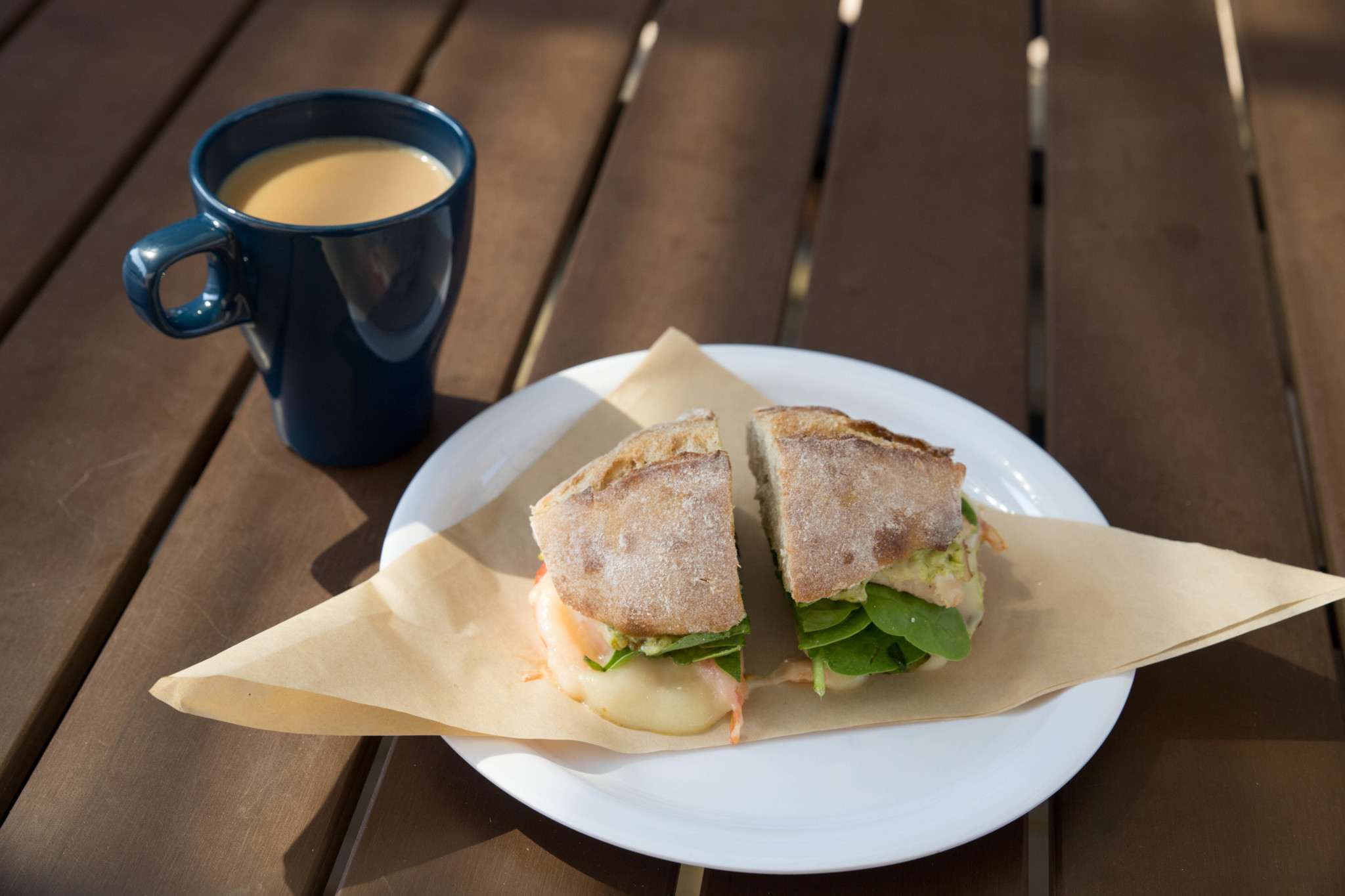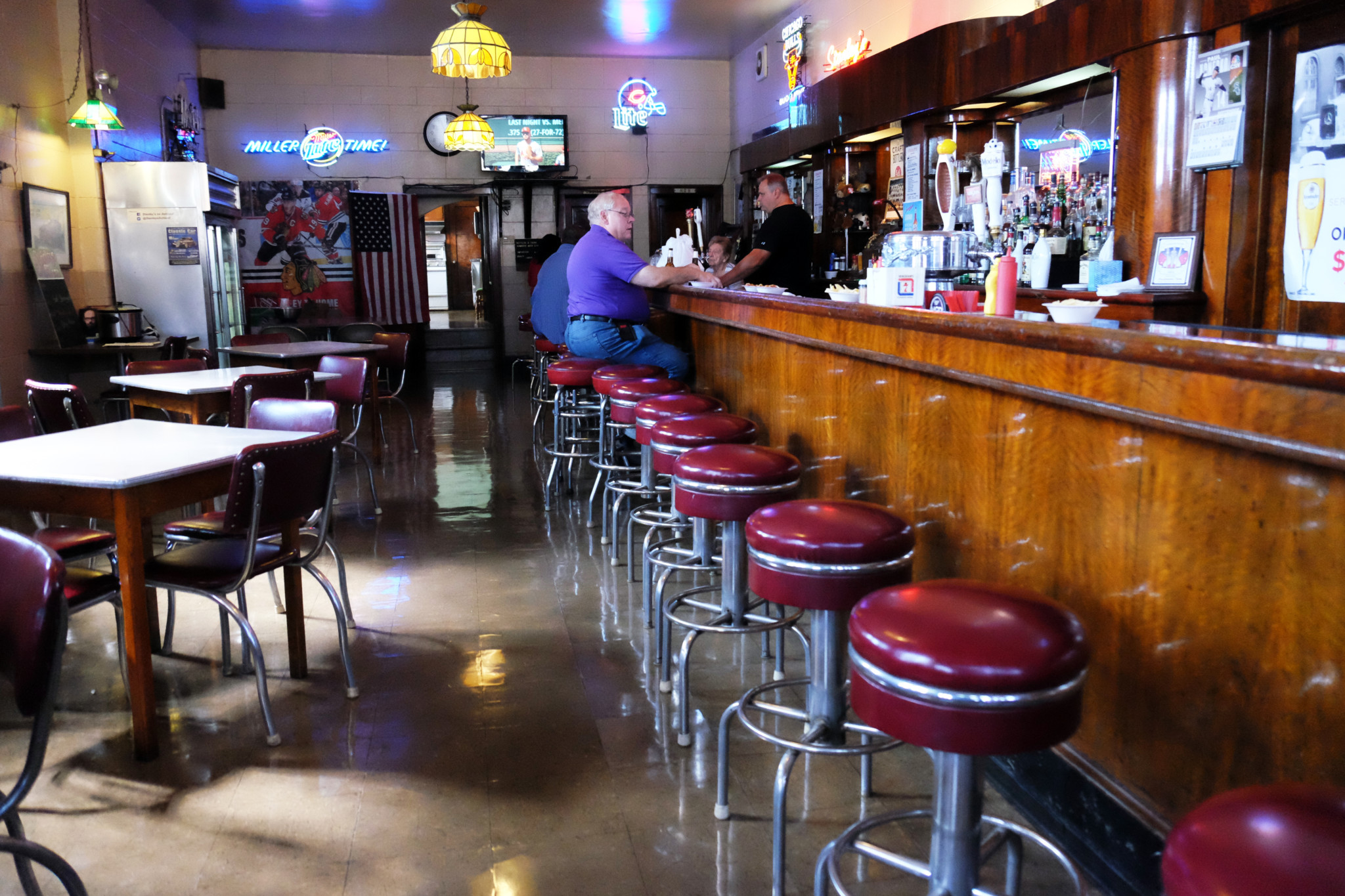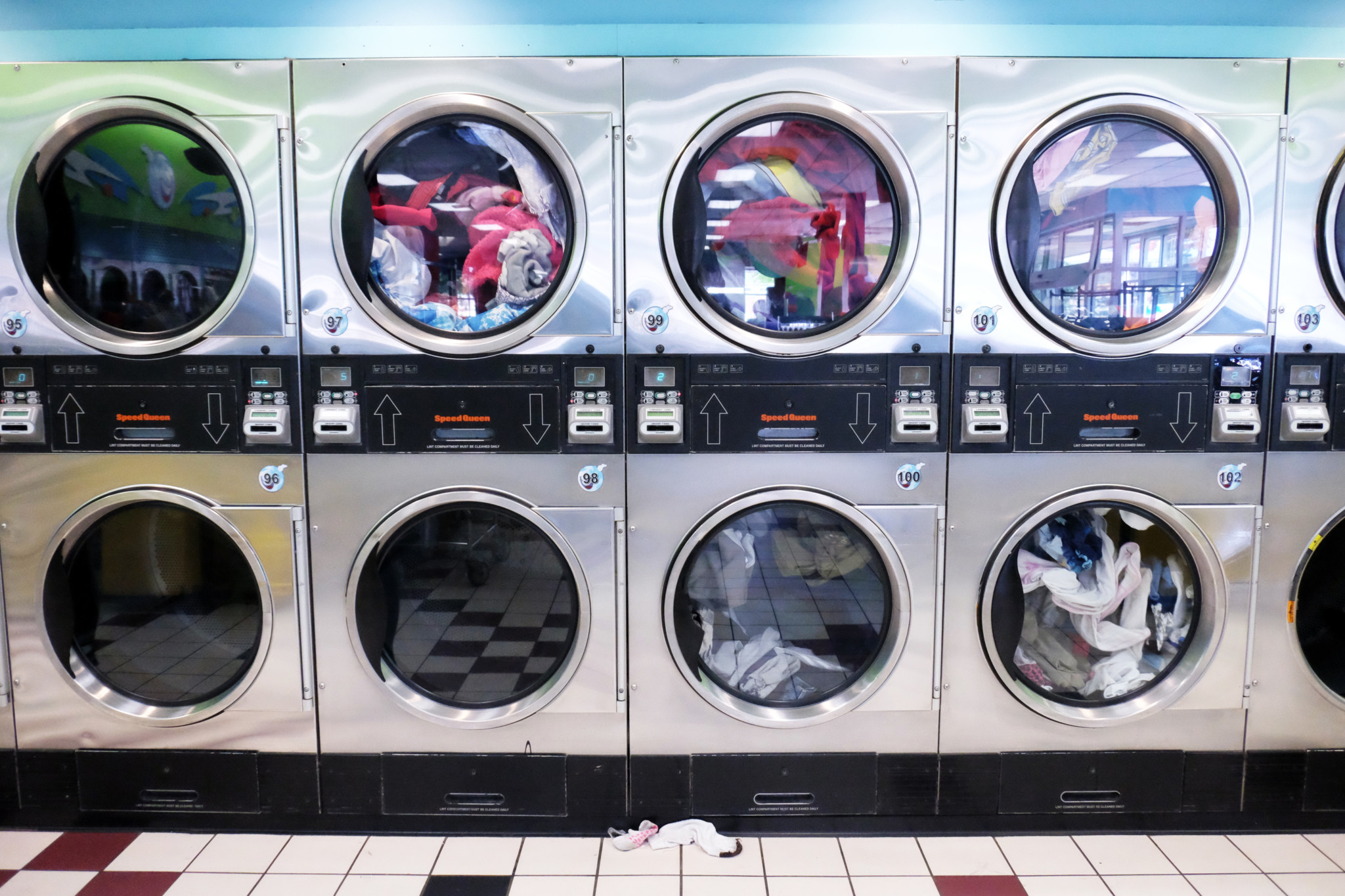- Best Laundromat
- Best Long-Distance Runners
- Best New Friend in the Form of a Coffeehouse
- Best Survivor of Seven Semi-Truck Sideswipes
A community like this—there’s no condos here—most of the houses don’t have in-unit washers and dryers, so folks are forced to use laundromat facilities. We think that this laundromat focuses on a really underserved niche—low-income, working-class folks. Clean clothes [are] a right, in our opinion. You can go without a lot of things, but everyone is entitled to clean underwear. You shouldn’t have to go to a rat-infested hole in the wall to clean your clothes. This is thought of as a safe place in a very dangerous neighborhood.
As far back as I [Atukwe] can remember, this has been a largely Hispanic, disadvantaged community. It has become significantly more violent. There are significantly more shooting deaths in the neighborhood than there [used to be]. I don’t know what to attribute that to, but it’s definitely the case. For us, creating an environment like this where a single mom with two children at 8:30pm at night in the dead of winter when it’s dark outside can come and feel really safe parking—where folks will help you get your stuff out of your car—it’s important. And we think it’s the right thing to do for the community.
Our mom had a spirit of service. The way our mom raised us was always to be grateful and give back in some way. We both had fortunate upbringings, and to whom much is given, much is expected. We have thousands of local residents that visit this facility every week, so being able to serve that many people—when kids are having experiences and chances they may not have had, being connected with the library and programming—it’s beyond meaningful. In this business, it’s necessary. (As told to Grace Hauck)
Yami and Atukwe Newell grew up nearby in Chatham, where they currently live, a couple blocks from one another. Yami graduated from Dartmouth, and Atukwe attended Stanford. They both returned to Chicago after school to work and give back to their communities.
Bubbleland on Western
Bubbleland on Western Avenue is the Disneyland of laundromats. Not only does this vibrant community hub boast a children’s play area, eleven flat-screen TVs, and a scratch-off lotto, but it even puts on family-friendly events featuring face-painting, jump houses, and visits with beloved characters from Dora the Explorer, Frozen, and Despicable Me. It’s also massive: one of eleven independently-operated Bubbleland locations, this laundromat is one of the largest facilities in Chicago.
Unlike Disneyland, however, Bubbleland never closes, and it offers a variety of free amenities. This 24/7, 365 days a year operation offers coffee, wi-fi, phone charging, and drying services—all for the cost of a wash. Above all, the bright, welcoming spot is supremely safe.
“What makes this store work for our staff and folks that are here is that it’s not a coin store,” said Atukwe Newell, who revamped the Western location with his sister, Yami, in 2015. “There’s no cash. Folks bring their money and exchange it for a laundry card, which they can use at all the machines and vending machines. It’s safe.”
Recently, Bubbleland even started a free “limo” shuttle service Monday through Friday, 8am to 8pm, to increase safety and accessibility. But the Newells have gone even further. They actively seek ways to help out their community by hosting voter registration groups, energy assistance and free cellphone programs, homework helper nights, back-to-school backpack giveaways, and more. The laundromat fills up when volunteers from the Chicago Public Library come to read.
“I think the library nights are the coolest nights we have,” Atukwe Newell said. “We shut the TVs off and call it ‘wash time is reading time.’ They read for an hour, an hour and a half, and the kids work on English and Spanish. What we hear from parents is that it is so helpful because English is not their first language.”
Bubbleland is extremely active on social media and regularly posts videos and events on Facebook, as well as Google and Yelp. Yami Newell, who also runs the Facebook page, will even throw up the occasional meme: You need to wash your clothes more often when laundry day feels like a high school reunion. (Grace Hauck)
Bubbleland Laundry, 5101 S. Western Ave. Open 24/7. (773) 825-5097. bubblelandlaundry.com
DREAMers and Allies Run Scholarship
For many undocumented students, who are always ineligible for federal financial aid and only sometimes qualify for state aid, affording college can be almost impossible. While the federal government is threatening to end Deferred Action for Childhood Arrivals (DACA) protections, eighteen runners are supporting undocumented students’ education by running the Chicago Marathon (and, in one case, the Des Plaines marathon) on October 8.
The DREAMers and Allies Run Scholarship is sponsored by the Holy Cross/Immaculate Heart of Mary Parish (its Immigration Committee, specifically) and began in 2012, when Hugo Dominguez and two others ran the Chicago Marathon to raise awareness for the challenges that undocumented students face. They asked people to sponsor each mile of their race and raised the $3,500 that went towards the first year of college scholarships. For the 2017–18 school year, they raised $15,000 for about fourteen scholarships.
“Our hope is to encourage youth to continue their education no matter what their immigration status is, especially under this administration, when there seems to be a new attack on immigrants every day,” said Quintiliano Rios, a member of the scholarship’s organizing committee.
Any undocumented student from Back of the Yards is eligible for the scholarship, which usually opens its applications in April. The selection committee focuses more on service to the community than academics.
This year, the DREAMers and Allies Run Scholarship has so far raised about $2,000; some of that money can be due to Dominguez, who’s running this year once again. People can sponsor miles online, and those who have already registered for the Chicago Marathon can still volunteer to be a runner for the DREAMers and Allies Run. Another branch of runners will also be participating in the Chicago Hot Chocolate 5K/15K run. All of them, however, will do so to defiantly prove that these students are, as the banner they run with proclaims, UNDOCUMENTED and UNAFRAID. (Adia Robinson)
Holy Cross/Immaculate Heart of Mary Parish, 4541 S. Wood St. (312) 324-4602. dreamersrun1@gmail.com. bit.ly/DREAMersRun
Best New Friend in the Form of a Coffeehouse
Back of the Yards Coffeehouse & Roastery

Back of the Yards Coffeehouse and Roastery has been open only since May, but it “feels like three years,” according to cofounder Mayra Hernandez. And it’s true that despite its recent opening, Back of the Yards’ only coffee shop already feels like a community fixture. The walls are plastered with flyers advertising community events and a photo exhibit by local artist Ricardo Cervantes. The tables inside and on the sunny outdoor patio are about half full with patrons chatting in English or Spanish over Sunday-morning coffee.
The Coffeehouse is both a shop and a roaster. It partners with coffee growers in Chiapas, Mexico, and for every twelve-ounce bag bought, one dollar is invested into a Social Impact Fund for Back of the Yards. Hernandez and her friend and cofounder Jesse Iñiguez started an Indiegogo campaign earlier this year to help get the shop off the ground and successfully raised about $16,000, or 150 percent of their funding goal. This coffeehouse—unlike many bougie espresso bars or cookie-cutter coffee chains elsewhere in the city—is clearly rooted in place. It sells Back of the Yards–themed merchandise and devotes a special spot on the counter to advertise upcoming DACA workshops taking place in the neighborhood. “We’re everyone’s friend,” said Hernandez, adding that the coffeehouse opening has been especially exciting for teachers and students at the neighborhood high school across the street, who have watched the process unfold, and that even former Back of the Yards residents have been coming back to visit and see the shop.
And, perhaps unlike your other friends, this shop offers what must be one of the best avocado toast deals in town: $3.25 for multigrain bread with fresh avocado spreads and vegetables. (If you’re feeling fancy, add eighty-five cents and spring for an egg; this meal will sustain you for a while). For coffee, the main event, there’s an extensive and exciting menu; I recommend the “Café de Olla,” a traditional spiced Mexican coffee. In its cold brew form, it’s combined with raw sugar molasses, which helps it go down without being overwhelmingly sweet. Try and get here before winter sets in so you can take advantage of the spacious outdoor patio; the roof keeps it shaded while plenty of sunlight streams in through the sides. (Mari Cohen)
Back of the Yards Coffeehouse, 2059 W. 47th St. Monday–Friday, 6:30am–7pm; Saturday–Sunday, 9am–3pm. Coffee starts at $2; food $2.50–$7. (312) 487-2233. backoftheyardscoffee.com
A previous version of this post misidentified the artist whose art hangs in Back of the Yards Coffeehouse as Ricardo Santos Hernández. His name is Ricardo Cervantes.
Best Survivor of Seven Semi-Truck Sideswipes
Stanley’s on Ashland

There used to be a large neon sign hanging above the door to inform passersby that this nondescript brick building is, in fact, a tavern. But in the family-owned operation’s ninety-three years, as America’s largest livestock yards gave way to factory land and Whiskey Row faded to thruway, Stanley’s has been hit by passing semi-trucks seven times—most recently taking the sign with it.
When I walk through the darkened double-door, I spy Stanley’s daughter Wanda Kurek holding court at the far end of the bar, sipping her daily Coke (hold the ice). The ninety-three-year-old spitfire is trading quips with her regulars and flirting with bartender Rich Miller, the self-anointed Friday afternoon “relief pitcher” who questions whether Kurek can even see above the bar. “Good things come in small packages, you louse,” Kurek says.
I order “lunch.” Just “lunch”—whatever six-dollar special Kurek decided to prepare on her porcelain stove at 4:45am that morning. It’s the only meal Stanley’s serves—a hearty hot plate offered 11am–2pm weekdays. If it’s a corned beef and mash day, you’re eating meat from Chicago’s City Foods. If it’s sausage and cabbage, you’re having Makowski’s. (“We only serve real sausage,” Kurek says.) Friday was a pork day. Kurek barked the orders, and Miller presented me with a plate boasting 1) a pulled pork sandwich, 2) cucumber salad, 3) sliced green peppers and onions, 4) potato chips, and 5) a pickle on top.
Kurek employs two bartenders, one waitress, and one kitchen assistant. Miller informs me that Kurek is very particular with her staff: “She doesn’t let just anyone touch that register.” And she should be. The business has been in her family since her father opened its original location in 1924, the year she was born. Stanley’s moved to the current location, a former grocery store-turned tavern, in 1935, when women weren’t allowed in bars and Stanley’s only had a men’s bathroom. While the clientele is still largely men from the area—mostly truck drivers and regulars from the packing place across the street—others trek from across the city.
“People come from all over the place to come here. One guy comes from Evanston and takes the bus to get here. People remember this place,” Miller said. “Some stop by because their parents used to have businesses here. They say walking in here is like walking into 1935.”
And it is. There’s a jukebox along one wall, a framed copy of Bing Crosby’s hit song “Run Sails in the Sunset” on another. The register is a museum-worthy A.J. Thomas machine, a Chicago company dating back to 1892.
Black-and-white photographs on the walls tell the story of the founding family: Stanley and Josephine Kurek and their five children, who all lived in rooms above the bar, where Wanda still resides. She started working at the tavern as a kid, first cleaning the floors on Saturday mornings, bartending by eighteen, then full-fledged owner by 1982.
“My mother was a cook,” Kurek said. “She was from Poland. Then she went to Denmark where she got papers to come to the United States, in 1915. She had a cousin in Chicago.”
Although Kurek has a big family, she doesn’t have any children. She hopes her nephew, Walter, will someday take up the mantle of the Stanley’s legacy: one of the longest continuously owned family-run taverns in the city. (Grace Hauck)
Stanley’s on Ashland, 4258 S. Ashland Ave. Monday–Friday, 10:30am–8pm; lunch served until 2pm. stanleys.beer
Support community journalism by donating to South Side Weekly

